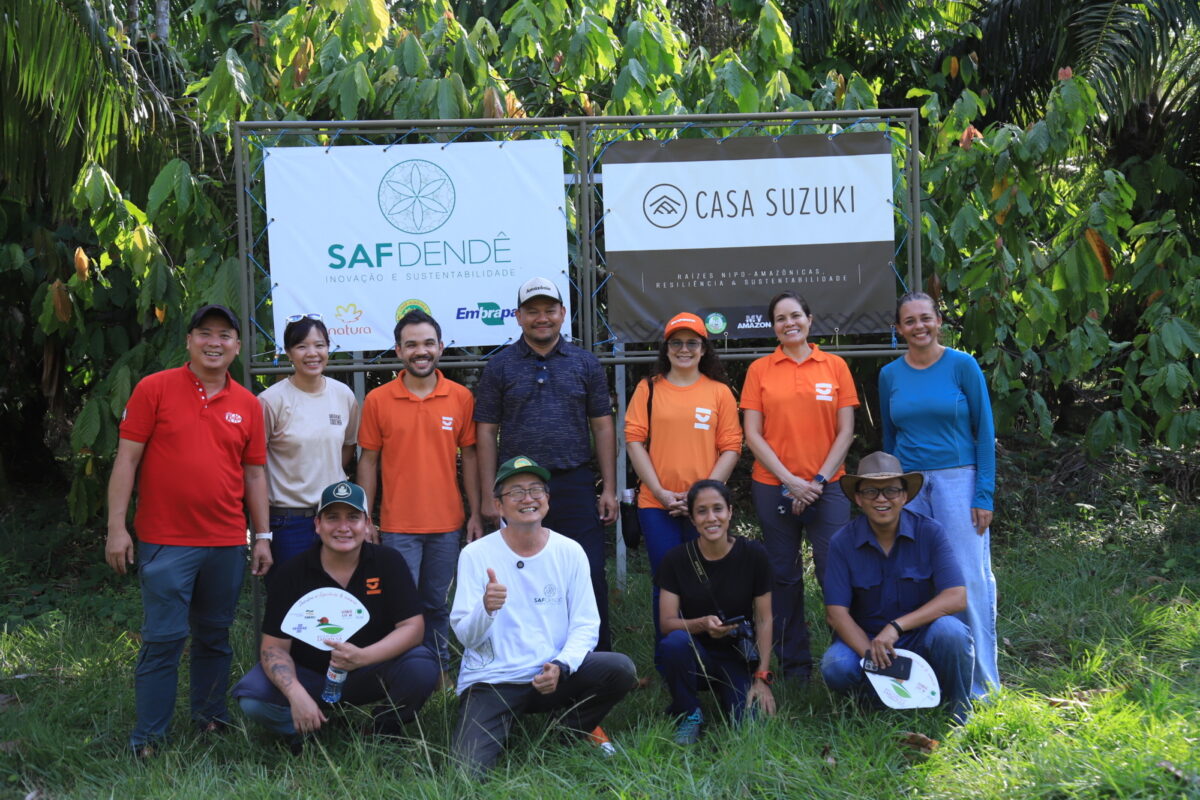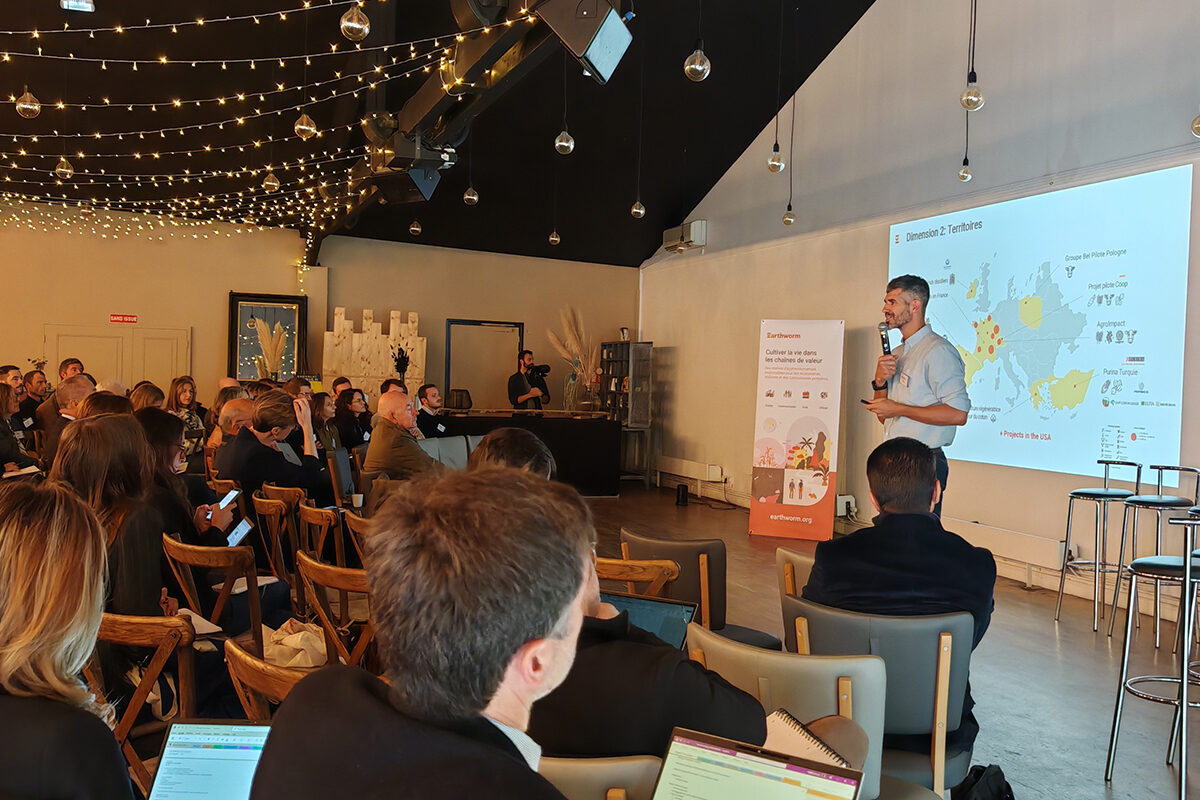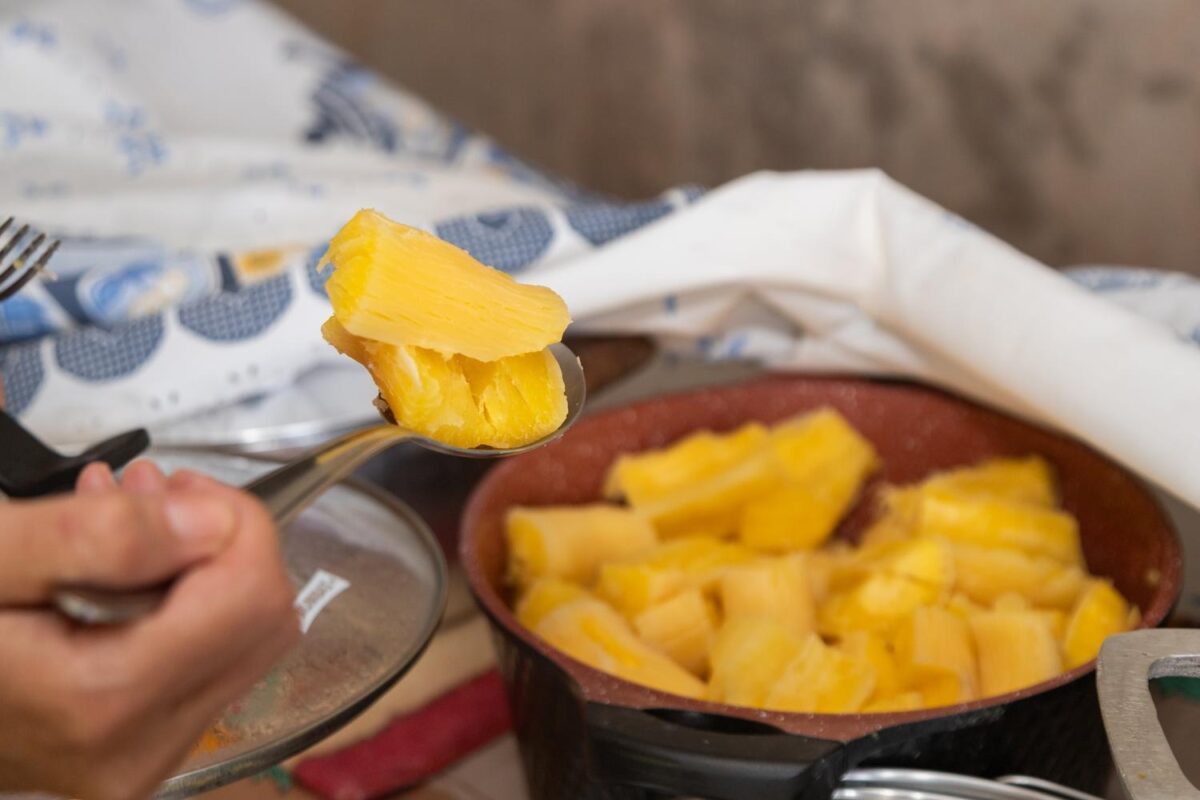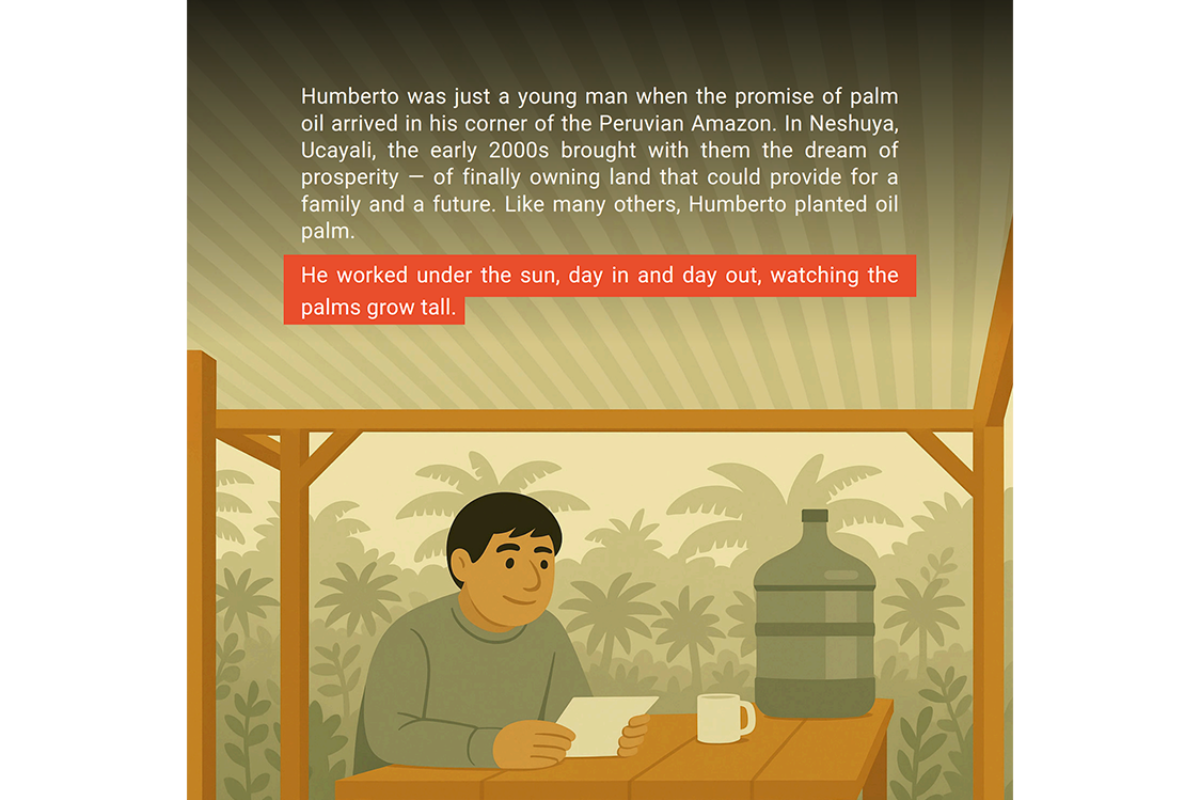Share
We began last year with a love letter. Earthworm Foundation's CEO, Bastien Sachet’s message to the soil was an invitation to look down, to acknowledge the living foundation beneath our feet that we so often overlook.
We asked you to see the soil not just as a resource to be managed, but as a partner to be understood. Ten months later, that partner has taught us more than we could have anticipated. We learned that the answers we need aren't waiting in a boardroom; they are growing in the fields, often in places the world forgets to look.
Wisdom Flows from the South
For too long, the story of agriculture has been one of top-down instruction. This year, we saw the power of the opposite. In a landmark collaboration, ministers and farmers from Côte d'Ivoire and Malaysia travelled to the agroforestry heartlands of Brazil.
There, amidst the cocoa and palm trees of Tomé-Açu, we witnessed a profound exchange. It wasn't about transferring technology; it was about sharing resilience. We saw that the solutions for the Global South are being built by the Global South, rooted in diversity, driven by farmers, and proving that regeneration is a universal language.

The Soil is Us
As we gathered with our partners in France recently, the conversation shifted. We moved beyond carbon and yield to a deeper truth: Soil health is human health. We are realising that the nutrient density of our food and the resilience of our own bodies are mirrored in the microbiome of the soil. Healing the land is not an act of charity for the earth; it is an act of survival for ourselves.

While global conversations shaped the agenda, the real work continued in the hands of our teams and communities. This is the daily rhythm of regeneration, measured not just in hectares, but in the footsteps of field officers and the decisions of farmers.
Preserving the Land for Generations: Jean-Christophe Sailly grew up on his family farm in Pas-de-Calais. Facing erosion and climate extremes, he is now planting miles of hedgerows and covering his soil year-round. It’s not just farming; it’s a promise to the future.
Building Trust, One Conversation at a Time: Regeneration moves at the speed of trust. Meet Rozikin, an Earthworm field officer in Riau, whose daily work involves listening to villagers and bridging the gap between company commitments and community needs.
The Science of Better Yields: For smallholders like Pak Atan, "soil health" means livelihood security. By applying better fertiliser management and targeted care, he isn't just improving his palm oil yield; he is securing his family's future.
Resilience in the Amazon: In Porto Velho, farmers Suely and Ari have faced both floods and droughts. With support from our agronomists, they are adapting their farm to survive the extremes, proving that resilience is a daily practice.
The Trailblazers: How do you turn a timber supply chain into a force for good? It starts with the people connecting the sawmills to the soil. These are the pioneers building a traceable, sustainable wood market in India.
Living and Seeing the Reality: In Africa, our teams don't just visit the field; they live it. This update shares the raw, unfiltered perspective of our staff on the ground, witnessing the challenges and the beauty of rural transformation firsthand.
If 2025 was about listening to the soil, 2026 will be about understanding what it gives us. We know that the more biodiverse the soil, the more nutrient-rich the food, and, crucially, the tastier it is.
In the coming year, we will explore this link between Soil Nutrition and Human Nutrition. We will do this through peer-reviewed science, through personal stories, and yes, through the tastiest recipes from across the globe. Because the ultimate proof of a healthy planet should be a healthy, nourished person.
We are the Earthworm. Let’s eat!

Every company sourcing agricultural raw materials depends on one thing: soil.
Yet today, a third of the world’s soils are degraded. That means less resilience, more emissions, and growing risk for supply chains and the people behind them.
At Earthworm Foundation, we work with companies and farmers worldwide to regenerate the soils that feed supply chains, absorb carbon, and sustain ecosystems. Regenerative agriculture (Regen Ag) is only possible when it starts with soil.
Not as a checkbox, but as the foundation for:





We work in sourcing landscapes worldwide, bridging farmers and brands, science and strategy, using soil health as common ground.
Let’s get down to business. Let’s get Down to Earth.
Explore our #DownToEarth approach to soil regeneration and regenerative agriculture.
In the soil, the earthworm connects the organic level to the mineral level. It goes up and down, creating horizontal galleries enabling the transfer of nutrients and minerals. And that movement and its digestive process creates humus. Creates life.
With companies in value chains, we do that same movement, between buyers and suppliers. And between civil society, government, agencies, and companies. Here we ensure that these actors collaborate to regenerate the supply chain. This way, their actions have a positive impact for people and nature. And the supply chains themselves become robust and resilient over time.

Soil regeneration isn’t the only aspect of regenerative agriculture, but it’s a powerful place to start. Healthy soil strengthens farms and creates common ground for farmers, companies, and experts to connect. It opens the door to wider conversations—about biodiversity, climate, and livelihoods.
By focusing on results rather than rigid practices, and by encouraging collective action across the value chain to support and reward farmers, we can make real progress.
Here are the three pillars of RegenAg at Earthworm:

To know what needs to be improved/regenerated. We measure soil health, biodiversity, impact on climate, profitability for the farmer, autonomy of the farm with regard to external inputs.

For the farmer and for the farm advisors. We build capacity through trainings, coaching, field tours and forming peer groups.

To economically ‘de-risk’ the process of transition for the farmer. We ensure that the extra cost of transition is covered, the farmer is rewarded for the progress and the performance.
At Earthworm, regenerative agriculture is about making soil health the key pillar of productivity.
Take Humberto Chávez’s story, for example, that began decades ago on his 50-hectare farm in Ucayali, Peru.
What started as a childhood dream to work with animals and water sources became something far bigger, a journey into sustainable palm oil, land regeneration, and climate resilience.
Over the past two decades, Humberto has faced the realities of drought, declining yields, and soil degradation. But instead of giving up, he has adapted.






From planting trees with farmers in India to supporting covering of soil in Peru and supporting crop diversification in France, each year has added to our understanding of what regeneration looks like on the ground.
This timeline shares key moments in our work to improve soil, support farmers, and strengthen supply chains.



Earthworm have helped embed regeneration not just into farming practices, but into the operating logic of supply chains. These strides are not isolated successes—they signal a broader shift toward food systems that are robust and resilient, climate-conscious, and rooted in healthy soil.
Earthworm Foundation is bringing about a soil-led transformation across French agriculture.
Improving soil health isn’t only a technical task—it’s deeply human.
Edi used to rely on logging to support his family. Liza was a housewife with no income of her own. Today, both are part of a farming collective in Muara Bungkal, Indonesia—growing crops, rebuilding their land, and supporting each other through floods and harvests. With support from Earthworm Foundation, they’re proving that regeneration starts with people.

Is it truly possible to scale up regenerative agriculture?
Swipe to explore Earthworm Foundation’s global impact.




Farmers are the true heroes of the regenerative agriculture movement, not just for what they grow, but for the risks they take to grow differently. In the face of degraded soils, rising costs, and a changing climate, they choose to restore rather than extract.
At Earthworm Foundation, our three pillar approach—measure, support, incentivise—is shaped by what we’ve learned from these farmers. This section is where you can hear directly from them—their stories of struggle, courage, regeneration, and hope.
Spend A Day In The Life Of Pak Attan, a farmer from the Kampung Sungai Mok village, and a palm smallholder. Earthworm Foundation supports Pak Atan on RegenAg efforts. His focus is on how to get the best soil for the palm he grows.
Jean-Christophe Sailly is a farmer in Pas-de-Calais, France. Born on a family farm surrounded by nature, he decided to transform his agricultural model in the face of climate change and erosion. In this video, he shares his journey towards regenerative agriculture, with concrete and visible results on his farm.
Earthworm Foundation’s soil initiatives are built on collaboration. From multinational brands to farmer cooperatives, its partners span the entire value chain—each playing a role in restoring soil health and building resilient agricultural systems. These members and allies bring scale, expertise, and local presence to the shared mission of making regenerative agriculture mainstream.
Nestlé Purina, PepsiCo, Noriap Maisadour, McDonald’s, Grupo Bimbo, Vivescia, Bel, Kellanova, Lidl France, Tereos, Coop, Saint Louis Sucre, Oxyane, HSBC, Kermap.